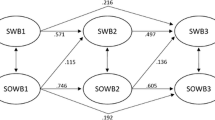Abstract
This paper provides a conceptual framework for viewing social well-being as composed of two elements: social adjustment and social support. Social adjustment is a combination of satisfaction with relationships, performance in social roles and adjustment to one's environment. Social support is composed of the number of contacts in one's social network and satisfaction with those contacts. Through the pioneering work of McDowell and Newell, comparative ratings of measures of social adjustment and social support are available. It appears that Weissman's Social Adjustment Scale and Sarason's Social Support Scale are currently the best measures in terms of validity and reliability. But, they are merely starting points for future measurement of these concepts.
Similar content being viewed by others
References
Abanobi, O.: 1986, ‘Content validity in the assessment of health status’, Health Values 10, pp. 37–40.
Barenthin, I.: 1975, ‘The concept of health in community dentistry’, Public Health Dentistry 35, pp. 177–184.
Basch, P.: 1990, Textbook of International Health (Oxford University Press, New York).
Blum, H.: 1976, Expanding Health Horizons (Third Party Associates, Oakland, CA).
Breslow, L.: 1972, ‘A quantitative approach to the world health organization definition of health: physical, mental and social well-being’, International Journal of Epidemiology 1, pp. 347–355.
Breslow, L.: 1989, ‘Health status measurement in the evaluation of health promotion’, Medical Care, 27 supplement, pp. S205-S216.
Brooks, W.et al.: 1990, ‘The impact of factors on measurement of functional status’, Medical Care 28, pp. 793–804.
Brown, J.et al.: 1984, ‘The dimensions of health outcomes: a cross-validated examination of health status measurement’, American Journal of Public Health 74, pp. 159–161.
Deliege, D.: 1983, ‘Indicators of physical, mental and social well-being’, World Health Statistics Quarterly 36, pp. 349–393.
Epstein, A.et al.: 1989, ‘Using proxies to evaluate quality of life: can they provide valid information about patients' health status and satisfaction with medical care?’, Medical Care, 27 supplement, pp. S91-S98.
Evans, D. and Gall, T.: 1988, ‘Response specificity revisited: stress and health status’, Journal of Clinical Psychology 44, pp. 108–114.
Goldman, B. and Busch, J. (eds.): 1982, Directory of Unpublished Experimental Measures Vol 3 (Human Sciences Press, New York).
Goldsmith, S.: 1972, ‘The status of health indicators’, Health Services Reports 87, pp. 212–220.
Hecht, H.et al.: 1990, ‘Anxiety and depression in a community sample: the influence of comorbidity in social functioning’, Journal of Affective Disorders 18, pp. 137–144.
Hersen, M. and Bellack, A.: 1988, Dictionary of Behavioral Assessment Techniques (Pergammon Press, New York).
Ishii-Kuntz, M.: 1990, ‘Social interaction and psychological well-being: comparison across stages of adulthood’, International Journal of Aging and Human Development 30, pp. 15–36.
Kaplan, R. and Anderson, J.: 1988, ‘A general health policy model: update and applications’, Health Services Research 23, pp. 203–235.
Kennedy, E.: 1989, ‘An examination of the relationship between childhood depression and social competence amongst primary school children’, Journal of Child Psychology and Psychiatry and Allied Disciplines 30, pp. 501–573.
Killian, T. and Killian, L.: 1990, ‘Sociological investigations of mental illness: a review’, Hospital and Community Psychiatry 41, pp. 902–911.
Lubin, B. and Zucherman, M.: 1988, ‘Affects, demographic variables, and health’, Journal of Clinical Psychology 44, pp. 131–141.
McDowell, I. and Newell, C.: 1987, Measuring Health: A Guide to Rating Scales and Questionnaires (Oxford University Press, New York).
Mechanic, D. and Hansell, S.: 1987, ‘Adolescent competence, psychological well-being, and self-assessed physical health’, Journal of Health and Social Behavior 28, pp. 364–374.
Meehan, R.et al.: 1988, ‘The stability of health status in rheumatoid arthritis: a five-year study of patients with established disease’, American Journal of Public Health 78, pp. 1484–1487.
O'Reilly, P.: 1988, ‘Methodological issues in social support and social network research’, Social Science & Medicine 26, pp. 863–873.
Orth-Gomer, K. and Unden, A.: 1987, ‘The measurement of social support in population surveys’, Social Science & Medicine 24, pp. 83–94.
Retzinger, S.: 1989, ‘A theory of mental illness: integrating social and emotional aspects’, Psychiatry 52, pp. 325–335.
Riehlman, L. and Wolchik, S.: 1988, ‘Personal goals and interpersonal support and hindrance as factors in psychological distress and well-being’, Journal of Personality and Social Psychology 55, pp. 293–301.
Segovia, J.: 1989, ‘An empirical analysis of the dimensions of health status measures’, Social Science & Medicine 29, pp. 761–768.
Siegmann, A. and Elinson, J.: 1977, ‘Newer sociomedical health indicators: implications for evaluation of health services’, Medical Care, 15 supplement, pp. 84–92.
Sintonen, H.: 1981, ‘An approach to measuring and valuing health states’, Social Science & Medicine 15C, pp. 55–65.
Sommers-Flanagan, J. and Greenberg, R.: 1989, ‘Psychosocial variables and hypertension’, Journal of Nervous and Mental Disease 177, pp. 15–24.
Steinberg, L.et al.: 1989, ‘Authoritative parenting, psychosocial maturity, and academic success among adolescents’, Child Development 60, pp. 1424–1436.
Strauss, J.: 1989, ‘Comment on Retzinger’, Psychiatry 52, pp. 336–338.
Sullivan, D.: 1981, Conceptual Problems in Developing an Index of Health (National Center for Health Statistics, Rockville, MD).
Temkin, N.et al.: 1989, ‘General versus disease-specific measures: further work on the sickness impact profile for head injury’, Medical Care 27 supplement, pp. S44–S53.
Verbrugge, L.: 1985, ‘Triggers of symptoms and health care’, Social Science & Medicine 20, pp. 855–876.
Ware, J.et al.: 1981, ‘Choosing measures of health status for individuals in general populations’, American Journal of Public Health 71, pp. 620–625.
Weinberger, M.et al.: 1987, ‘Assessing social support in elderly adults’, Social Science & Medicine 25, pp. 1049–1055.
Weinert, C. and Tilden, V.: 1990, ‘Measures of social support: assessment of validity’, Nursing Research 39, pp. 212–216.
WHO Psychiatric Disability Assessment Schedule: 1988 (World Health Organization, Geneva, Switzerland).
Williams, J.et al.: 1989, ‘The person-in-environment (pie) system for describing problems of social functioning’, Hospital and Community Psychiatry 40, pp. 1125–1127.
Author information
Authors and Affiliations
Additional information
Prepared for delivery at the American Public Health Association meeting in Atlanta, Georgia November 1991.
Rights and permissions
About this article
Cite this article
Larson, J.S. The measurement of social well-being. Soc Indic Res 28, 285–296 (1993). https://doi.org/10.1007/BF01079022
Accepted:
Issue Date:
DOI: https://doi.org/10.1007/BF01079022




